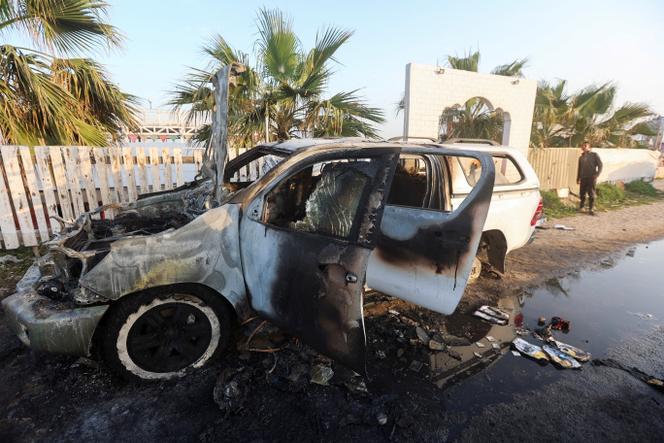


Seven members of the food aid organization World Central Kitchen (WCK) were killed in an Israeli strike on Monday, April 1, in Gaza. A video of the aftermath of the strike shows two of the American NGO's vehicles destroyed, one with a large hole in its roof where the WCK logo once was. Israeli daily Haaretz reported on Tuesday that three missiles were fired one after the other at the convoy after it left a warehouse in Deir al-Balah. According to Haaretz's sources from the Israeli defense forces, after the first strike, some of the convoy's passengers were seen leaving the car for one of the other two. They continued driving but another missile hit them, with the wounded who survived this second strike moving to the third car, which was also eventually hit.
Haaretz reports that the Israeli army's war unit responsible for security identified an armed man in one of the trucks before it arrived at the warehouse, but they did not see him leave the warehouse when the convoy left. On Wednesday, the chief of the General Staff of the Israeli army Herzi Halevi said that the army made "a grave mistake. It was an error that followed a mistaken identification at night, during a war, in very complex conditions. It shouldn't have happened," he said. The previous day, Israeli army spokesperson Daniel Hagari announced an "investigation at the highest level" to clarify the circumstances of what he described as a "tragic accident."
These kinds of strikes are validated by command rooms staffed by military and legal experts, who take into account the risk of collateral damage. Monday's deadly strike comes as Israel's compliance with the rules of law has been questioned in recent weeks before the International Court of Justice in The Hague. The strike drew condemnation from the international community, rekindling fears among NGOs providing aid to Palestinians in the enclave. Prime Minister Benjamin Netanyahu claimed his military "unintentionally hit innocent people," which he said "can happen during a war."
The "convoy was hit as it was leaving the Deir al-Balah warehouse, where the team had unloaded more than 100 tons of humanitarian food aid brought to Gaza on the maritime route," WCK said in a statement on its website. They said that they had coordinated their movements with the IDF so that the convoy would not be mistaken for a target. The three vehicles, two of which were armored, headed for WCK's logistics center in Rafah, on the border between the Gaza Strip and Egypt, the CEO of Anera, the organization's main partner in the area, Sean Carroll told Le Monde by telephone from Amman, Jordan.
You have 70.61% of this article left to read. The rest is for subscribers only.
